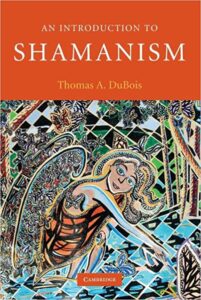
The term “shaman” comes from the Tungusic and most appropriately applies to mediums and healers within the Evenki culture (found in modern Russia). Nevertheless, lacking a more generalized term for such practitioners of animistic worldviews, anthropologists use the term as a general one. Most offer the caveat that, whenever possible, the specific term within a given culture should be used (e.g. mudang for Korean shamans).
Dubois’s book presents a masterful overview of numerous shamanic practices from around the world, often focusing on the striking similarities between them. While the book adopts a scholarly approach that might be a bit too detailed for a casual interest, for those wanting a deep dive, look no further.
Whenever possible, I read on my Kindle app, making use of its highlighting, note taking, and bookmarking features to organize my research. Herein lies the book’s only real weakness: the Kindle formatting work was poor, with unexpected line breaks in the middle of sentences. Such errors do not make it unreadable, but they do interfere, especially at first. This was a book that deserved a better treatment from the publisher.
